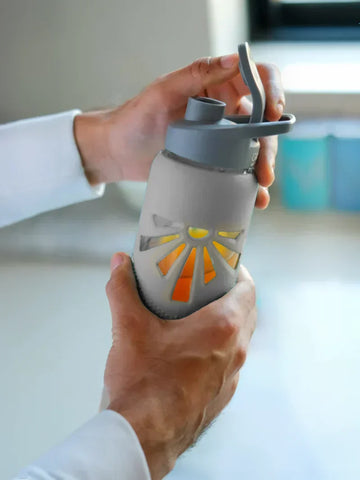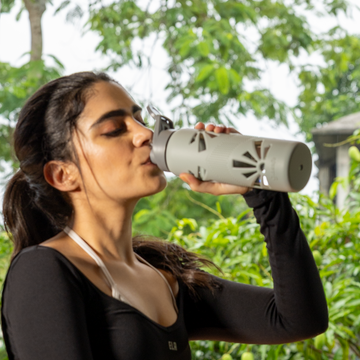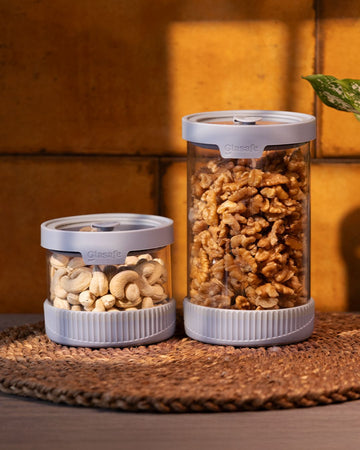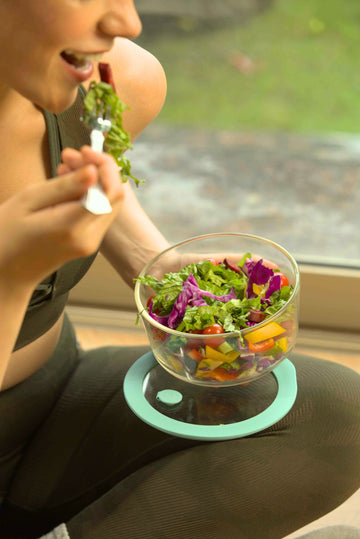We all appreciate how easy it is to carry a bottle of water with us wherever we go in the summer. However, have you ever experienced that aftertaste? It's plastic, not just your imagination. Your water's flavor may change if you use plastic bottles. Taste influences how much water you drink, how often you hydrate, and even how safe you feel while doing so. It's not just a matter of personal preference.
Selecting the appropriate water bottle can have a significant impact on maintaining proper hydration levels. Whether you are refilling at your desk or taking a quick sip on the go, the material you select—glass or plastic—has distinct advantages and disadvantages that impact the environment and your way of life. Let's know the science underlying why plastic bottles alter the flavor of water, the potential health risks, and solutions.
The Science of Taste and Water
Water is naturally colorless, odorless, and tasteless. Each branded water has a distinct flavor due to the minerals (such as calcium and magnesium), dissolved gases, and storage container. Because our taste buds are so acute, we may more easily notice changes.
Water in plastic bottles leaches traces of chemicals and microplastics into your water. It can change the water's taste by making it taste musty, metallic, or plastic-like. Environmental elements like heat and time intensify these effects, making the flavor shift much more apparent.
What’s in Your Plastic Bottle?
The two most common materials used to create plastic bottles are HDPE (high-density polyethylene) and PET (polyethylene terephthalate). These polymers contain chemicals like plasticizers and stabilizers that may occasionally leak into the water, even though they are typically believed to be safe for one-time use.
Some plastics, especially older or non-reusable plastics, may contain BPA (Bisphenol A), a chemical associated with hormone disruptions. BPA-free plastics are not entirely risk-free, though. Alternatives like BPS and BPF have shown similar behavior in some trials.
Microcracks and plastic deterioration from reuse or exposure to stressors like heat or UV light can cause chemical leaching. This chemical movement slowly alters the flavor and safety of your drinking water.
Factors That Worsen the Taste Change
Heat Exposure: Leaving your plastic water bottle in a hot car or out in the sun speeds up the leaching process. Heat causes the plastic molecules to break down faster, releasing them into your water.
Reuse of Single-Use Bottles: These bottles are not designed for long-term use. With every refill, it increases the chance of contamination and leaching.
Long Storage Times: Storing water in plastic for days or weeks can make it taste stale as it leads to leaching of chemicals and oxygen through the plastic can degrade freshness.
Poor Cleaning Practices: Bacteria and residue buildup can mix with plastic-degraded water, resulting in a funky taste and possible health risks. Unlike glass, plastic retains smells and stains.
Health Implications of Taste-Altering Chemicals
When your water begins to taste different, it could be a clue that something is off. Endocrine disruption, developmental problems, and metabolic abnormalities are associated with trace substances that leak into water, such as phthalates, BPA, or antimony.
Even with established regulatory limitations, repeated exposure accumulates. Your body may be trying to tell you something is wrong by giving you an unpleasant taste.
Water for drinking should feel fresh and clean. It's time to investigate the source if it doesn't.
We have a survival instinct that makes us avoid things that taste awful. You're less likely to drink enough water if it constantly tastes bad. This has a significant effect on hydration, particularly for older adults and children who already have trouble drinking enough water. So, try to find out better ways of staying hydrated and in the most purest form.
How Glass Bottles Preserve Taste Better
Borosilicate glass bottles are made from natural ingredients and are non-reactive as they don’t leach chemicals into your water. This property ensures clean, pure water with every use, a significant health benefit. They are ideal for taste retention, as they do not absorb or retain flavours, keeping water fresh-tasting and pure.
This quality is especially appreciated by those with sensitive taste buds. They are fully recyclable and made from natural materials, making them more eco-friendly. It is more sustainable in the long term. They offer better insulation, retaining the temperature of hot or cold liquids effectively. These are ideal for keeping beverages at desired temperatures.
Glass bottles, like those from Glasafe, are spill-proof, easy to clean, and retain the natural purity of water. Its borosilicate glass offers better durability against temperature changes, and protective silicone sleeves add extra security.
How to Identify Taste Changes in Your Bottle?
You may choose to overlook the peculiar taste, but the problem must be resolved as quickly as possible. To identify changes in taste, look for signs such as a rubber or plastic smell, a stale or bitter aftertaste, haziness in the water, or scratches or dents on the bottle. Replace your bottle or use a better material, such as glass, if any of these are present.
For cleaning the bottle, use warm water and mild soap to scrub the interior and exterior of your water bottle, giving particular attention to the mouthpiece and cap, to get rid of the strange flavor. Give it a thorough rinse and make sure there is no soap residue left. Use a bottle brush to get rid of any tough residue from bottles with small openings or difficult-to-reach places.
Rinse the bottle one last time after using the brush to make sure no particles are left behind. You can prevent bacterial growth and get rid of any residual scents by periodically sanitizing your water bottle. Another option is to mix a teaspoon of vinegar or bleach with a cup of water, then leave the mixture in the bottle for a few minutes. Before refilling, give it a good rinse to get rid of any remaining taste.
Frequently Asked Questions
1. Does plastic affect the taste of water?
Yes, plastic can leach chemicals into water, especially when exposed to heat or stored for long periods, altering taste noticeably.
2. Why does water taste different in plastic bottles?
Because plastic can release trace chemicals (like antimony, phthalates, or BPA substitutes) that subtly change water’s flavor profile.
3. How to remove plastic taste from a water bottle?
To remove the taste of plastic from the bottle, wash the bottle with warm water, baking soda, or vinegar. It’s best to stop reusing single-use plastic bottles.
4. Why should we not keep water in plastic bottles?
Plastic bottles leave an aftertaste, release harmful chemicals, get micro-scratched and unsanitary over time, and are not ideal for long-term storage.
5. What is the healthiest water to drink?
Filtered water stored in glass bottles is the healthiest water to drink. It’s clean, mineral-balanced, and chemical-free.
6. Why are plastic water bottles banned?
Plastic bottles are banned to reduce environmental damage, plastic pollution, and public exposure to chemical leaching.
7. What is the #1 best water?
Fresh, mineral-balanced, clean water from a natural spring or filtered via high-quality systems, stored safely (preferably in glass bottles).
8. Does boiling water purify it?
Boiling the water kills bacteria and viruses present in it, but doesn’t remove chemical contaminants or heavy metals.
9. Is snow water safe to drink?
Snow water is safe to drink only if it’s melted, filtered, and boiled. Snow can contain pollutants depending on location.
10. Can you drink ocean water?
No. Saltwater can dehydrate you and damage your kidneys.
11. Why is ocean water salty?
Ocean water contains dissolved minerals like sodium chloride from rock erosion and river runoff.
12. Is freshwater drinkable?
Freshwater is drinkable only if it's clean. Many freshwater sources contain pathogens and must be filtered first.
13. How long can you go without water?
A human can typically go without water for 3–5 days. However, it is essential to always stay hydrated.
14. Are we losing water on Earth?
We’re not losing water, but usable fresh water is becoming scarce due to pollution, overuse, and climate change.
15. Which water is not drinkable?
Saltwater, contaminated river water, tap water, and industrial wastewater are not drinkable.





